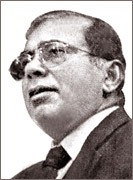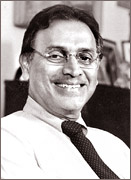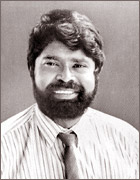At last, a rudimentary roadmap?
By Dayan JAYATILAKE
|

CR de Silva
|
The Lessons Learnt process is turning into quite an exercise in
public pedagogy and performance, though it could be better. I rather
liked Prof Rajiva Wijesinha’s ‘all round the wicket’ batting -
interspersed with episodes of whistle blowing (if one may mix one’s
sporting metaphors) — but then again I would, wouldn’t I? The
mini-debate between LLRC Chairman and former Attorney General CR de
Silva and Ambassador Jayantha Dhanapala was rather a superfluity. Mr de
Silva held that the Tamil people wanted equal status and equality of
opportunity, not constitutional reform, while Mr Dhanapala seemed to
demur, defending the need for an enlightened framework of basic law.
They were both correct. Equality of citizenship and opportunity, while a
guiding goal, needs Constitutional guarantee and expression, while any
Constitution should be informed by the spirit of such equality while
enshrining it as an explicit principle and aim.
The LLRC dropped the ball with Ambassador Dhanapala, failing to
inquire into the post tsunami mechanism he negotiated with the LTTE.
That exercise in ‘civilised diplomatic negotiation’ by an senior
professional of great experience resulted in a mechanism that was so
heavily laden in favour of the Tigers that it was hit by a ‘double
whammy’: its main operational tier was frozen by the Sri Lankan Supreme
Court and the United States refused to contribute a dollar in post
tsunami assistance to it because US laws prevented funds being
transferred to a terrorist-dominated structure such as the PTOMS was.
The PTOMS had a three tier structure. The apex body had three
members; one from the legitimate government of Sri Lanka, one from the
terrorist separatist LTTE and one from the Muslim community. In other
words, the Sri Lankan State and the Tigers were placed on an equal
footing: GG Ponnambalam’s ‘fifty-fifty’ with bells and whistles on, or
rather, RPGs and Claymores. The story got worse. The key operational
tier was the second tier, and there the LTTE had been conceded a larger
number of representatives than the Government and the Muslims (5:3:2).
The least objectionable third tier had representatives of the Govt, the
LTTE and NGOs. The PTOMS was to be headquartered in Kilinochchi, the
Tiger ‘capital’; the ‘heart of darkness’.
|

Jayantha Dhanapala |
This Tiger dominated structure was accorded the right to do “post
tsunami rehabilitation work - in the coastal areas hit by the tsunami,
which mean it would have been utilised by the LTTE to rebuild its Sea
Tiger network ( hit by the tsunami) and seed coastal areas under Sri
Lankan military control, with clandestine Tiger cells.
Sri Lanka must thank the JVP and ex-Chief Justice Sarath Nanda Silva
for saving us from the PTOMS and its consequences, though the final
thanks go to the Lankan voters who opted for Mahinda Rajapaksa over the
Ranil-CBK combine.
Now for some good news: it was great relief to read an extensive
statement by a senior Cabinet Minister of the Sri Lankan government
which contained a lucid revaluation of the war and a clear, correct
policy framework for the post war future. Unsurprisingly this came from
Prof GL Pieris, and suitably enough, it was at a respected think tank
(dating from the days of Mao and Zhou en Lai) in Beijing, strategically
Sri Lanka’s most reliable friend over the long duration. Having listened
to Prof Pieris addresses audiences from Colombo in 1990 through to
Geneva during my stint, I am fairly sure he spoke ex tempore, being one
of the few Sri Lankan speakers capable of doing so with easy success at
any forum. The current Secretary General of SAARC, Dr. Sheel Sharma, PhD
in Advanced Physics, buoyed my morale when he admiringly observed this
about our new Foreign Minister over lunch in Singapore after a
talk/discussion at the Institute where I am based.
Prof Pieris accurately recreates the international and policy
backdrop:
“...It is, therefore, worth pausing to reflect for a moment on how
this became possible, because the gloomy prophesy that we heard all too
often from the international community, was that it was simply not
possible to prevail against the Liberation Tigers of Tamil Eelam in the
battle field.
We were told, no doubt with good intentions, by countries which had a
whole reservoir of military expertise, that terrorism could not be
defeated militarily. The experience of Sri Lanka demonstrates the
contrary, so the question is, how was it possible for a small country
with very limited resources, with a small Army, Navy and Air Force to
succeed, where other larger countries with far more substantial
resources at their command, failed? What is the explanation of this
remarkable phenomenon?
He then makes a fundamental point which holds true for all imperial
or expeditionary ventures at counter-terrorism. Neither
counter-insurgency nor counter-terrorism can be successfully or
sustainably exported.
“One of the most important lessons is that, if you are to succeed in
an endeavour of this kind, the effort has to be made by the country
itself. There is no way that you can call in the armies of another
country.
However well meaning and well disposed that other country may be, it
simply does not work on the ground because, directly you have the armies
of another country fighting with a terrorist group within your own
shores, what inevitably happens is that the population of your country
tends to rally round, in support of the terrorist group against a
foreign army that is seen as an invading force. Consequently, the first
lesson is that, it is your own military that has to be entrusted with
the responsibility of overcoming terrorism, of course with assistance
from your friends.”
|

Prof Rajiva Wijesinha |
Having correctly cautioned that ‘the explanation of what occurred in
Sri Lanka is multi-faceted. There is no single cause that you can
attribute to what was accomplished in Sri Lanka’, he rightly observes
that “There were many components, many factors which contributed to this
overall result. One was determined and resolute political leadership...”
Perhaps most relevant of all is his exposition of State policy for
post war Sri Lanka, the first enunciation of its kind, doubly important
because it was in Beijing, which gives the lie to the comforting insular
myth that a political resolution is solely a concern of the West, Tamil
Nadu and societies with a Tamil Diaspora (South Africa, Malaysia,
Mauritius), and that the East, especially China, is immune from such
interests and considerations. In the programmatic hub of his
presentation, Prof Pieris says:
“...there is a lacuna which has been created by the physical
elimination of the elected Tamil leadership.
The problem is, as you address substantive issues connected with the
devolution of power or power sharing, whom do you engage with? Who are
the legitimate interlocutors on the other side, especially at the
grass-roots level?
President Rajapaksa does not believe for a moment that a military
victory, by itself, will provide us with a durable and lasting solution.
I would say a military victory is a necessary condition, but it is by no
means a sufficient condition.
There must be other requirements to be satisfied. In other words, a
military solution has to be supplemented by political initiatives. That
means that you must put in place arrangements for redistribution of
power, empowerment of minority communities, all of which would require
vigorous consultation with minority groups.
...we held free and fair elections which have enabled the Tamil
community to elect representatives of their choice, to negotiate with
the government in power.
... It is not possible mechanically to transplant into your own
environment solutions which had worked well elsewhere, because no two
situations are identical. You have to adapt successful solutions
elsewhere, to suit the combination of circumstances in your own country.
There is no size that fits everybody.
There is no universal prescription for problems of this kind...A
particular solution that is suitable for your own country is determined
by many factors such as one’s own history and culture, the social and
economic institutions in one’s own country, the cultural mindset of
people, their practices, customs, beliefs and value systems. The nuances
of the local situation are of critical importance in determining the
nature of the solution that is suited for one’s own country.”
In the concluding part of his presentation, Prof Pieris demonstrates
a sure grasp of ‘the key link’ (to dip into the lexicon of the Communist
Party of China).
“In the post conflict stage, it is vital to move the country rapidly
towards reunification and emphasis on a national identity. If you take
South Asia, one of the basic policy dilemmas of South Asia is to answer
a fundamental question.
How do you reconcile ethnic and cultural pluralism with the concept
of mature nationhood? This is a problem that not only Sri Lanka but
every nation in South Asia has had to consider in earnest. To put it
simply, what are the economic and social structures that you need to
create in order to enable people speaking different languages,
professing different religions, coming from different cultural
backgrounds to feel at home, in one country, without any sense of
exclusion? That is very important.”
This then, is at last, language the world can understand and relate
to. It is precisely what the entire international community, including
our staunch friend China, wants to hear. It is what our friends need to
be reassured of, so that they can continue to support and defend us in
all forums.
It is what the world is waiting for us not just to say, but to do.
The day we accomplish this task, the international siege will be no
longer sustainable. This is the path that leads to sustainable peace.
|

